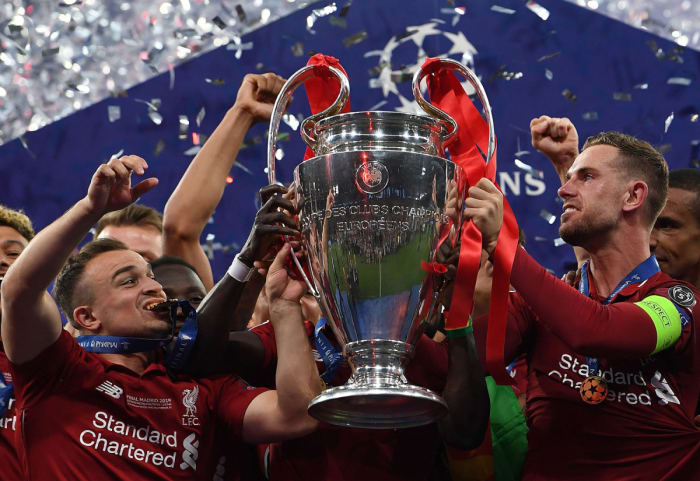Suffering Before the Sweetness: How Liverpool Won the Champions League Title
MADRID – This was not a Champions League final that neutrals will care much to replay. For long spells the football was scruffy and disjointed. Two teams that have been so lauded for their fluency and aggression offered up a final that came nowhere near matching the extraordinary drama of the semifinals and quarterfinals. But Liverpool will not care. A 2-0 win means it has a sixth European title, taking it ahead of Bayern Munich and Barcelona to third in the overall rankings, and, more importantly, it has its first trophy of the Jurgen Klopp era.
It’s been four years now since Klopp took the Liverpool job. His first game, appropriately enough, was away at Tottenham. He arrived is messianic fashion, charisma beaming from him, fans jostling to see him first emerge from the bus at White Hart Lane. That Liverpool has improved radically since then is undeniable. Its football in accumulating 97 points in the league this season has been astonishing. But it hadn’t won anything. When Virgil van Dijk spoke last month of the club standing on the brink of a golden age, it sounded worryingly like offering a hostage to fortune. This win ends all that anxiety–and also ends Klopp’s run of losing in six successive finals.
It was not a great performance, and it was not a great game; Liverpool’s pass-completion rate was only 64 percent. But it was good enough. Van Dijk was excellent, barely giving Harry Kane a kick, and when called into action, Alisson made the necessary saves. Perhaps most important of all, when things began to go wrong, when passes went astray and when Tottenham began to mount a degree of pressure after halftime, Liverpool had the character to survive.
“It’s not about playing well,” as Tottenham manager Mauricio Pochettino said, “it’s about winning.”
But then this is a side full of players who have known what it is to struggle. Jordan Henderson, who lifted the trophy as captain, was so derided after his arrival from Sunderland that Damien Comolli said that it was signing Henderson that cost him his job as director of football strategy at Anfield.
“You know what people said about some of these boys,” Klopp said. “Jordan Henderson is captain of the Champions League champion 2019. That is satisfying.”
Seven years ago, Andy Robertson was an undergraduate playing amateur football for Queen’s Park and tweeting about not having enough money; two years ago he was relegated from the Premier League with Hull City. Even Mohamed Salah, who scored the opening goal from the penalty spot, was written off during his time at Chelsea. In this season of great comebacks, the Champions League was won by a team packed with players who have themselves come back from rejection or derision.
“Tonight the boys showed the resilience and everything we needed to block the balls,” said Klopp. “[Alisson] made some saves and seemed absolutely unbeatable. Before I’ve sat here and had to explain how we lost; now I just want to enjoy winning it.”
That the win was rounded off by Divock Origi, who spent last season on loan at Wolfsburg and very nearly went to Huddersfield, scoring yet another important goal was perhaps only fitting.
Salah’s goal effectively settled the game. Having gone ahead with a second-minute penalty, it didn’t matter so much that it struggled for fluency: the onus was on Tottenham to attack, and all Liverpool had to do was resist. That goal, though, was controversial, stemming from yet another contentious handball decision in a season that has been full of them. In reality, the way the law has been interpreted in the Champions League this season, it was a clear penalty, but whether it should be is another issue. Moussa Sissoko’s arm was extended, but the ball was flicked into it from close range via a deflection off his chest. The penalty area has suddenly become a fraught place, full of traps that the ball might suddenly hit to concede a penalty; the law, surely, wasn’t introduced for that.
But that is a debate perhaps for another time. As the law now stands, the decision was correct and Liverpool, you suspect, wouldn’t much care even if it weren’t. When Klopp arrived at Anfield he suggested that if he were still there four years later he would have brought one title. He pushed it to the edge, but he proved as good as his word.






